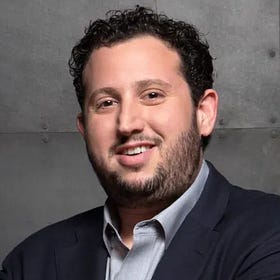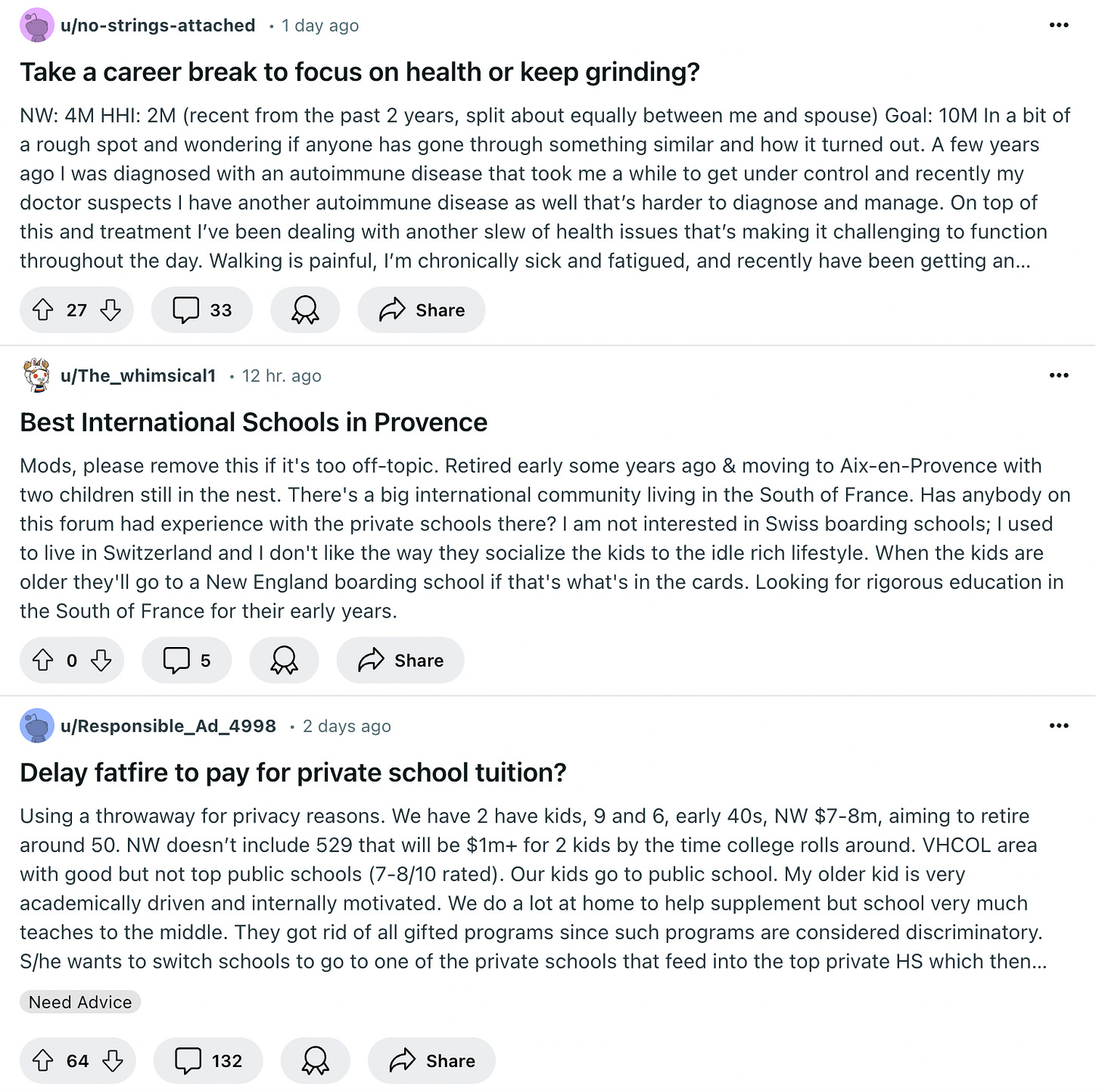GUEST LECTURE: Clayton Gardner
This interview is part of a Feed Me feature called Guest Lecture. In this series, I’ll introduce you all to an expert who I’m curious about, and give readers an opportunity to submit questions to them. Typically, only paid readers can ask questions but because I worked with Titan on this sponsored post, the chat was open to all readers.
Clayton Gardner is the co-CEO and co-founder of Titan, a wealth management app that allows users to access actively managed and alternative investments that are typically only available to the very wealthy. Earlier this week, you all asked questions about his thoughts on “Founder Mode,” which scenes in HBO’s Industry are particularly hyperbolic, who the ideal Titan customer is, and why they never need to raise money again.
1. “What finance apps are on your phone, and what role does Titan play vs. the other ones?” - Emily
I have an embarrassingly large number on my phone because I’ve done a ton of product research for Titan and am too lazy to delete them all once I’m done. I’d say Titan is my only daily use app because it’s where I manage my wealth. I used to use a lot of other apps every day to just do balance checking, but this past summer we launched a pretty sweet feature in the Titan app called Wealth Watch where you can link all your outside accounts – investments, checking, savings, retirement, credit cards, etc – and track all your balances and changes in one place. We literally built it for ourselves, and it’s been a huge hit. So that’s why Titan is the only daily app now for me. The only other apps I use weekly are for spending and moving money: Chase and Venmo.
2. “Thoughts on Founder Mode? How does it relate to ‘ownership culture’ at early stage companies?”
[First off, full disclosure: Paul Graham (PG) wrote the article on Founder Mode, and he founded Y Combinator; Titan went through Y Combinator and PG is an investor in Titan.]
I think PG clearly hit a nerve in his post on Founder Mode. This whole “year of efficiency” / “time to get lean” mantra has been permeating the tech world for the last few years since companies got way too bloated after the COVID stimulus hangover hit. Zuck started it when he slashed various layers of expensive managers in his “year of efficiency” strategy. You saw Andy Jassy at Amazon do the same just a few days ago with his mandate to cut the manager-to-IC ratio and get back to in-person work every day. So the wheels have been in motion on this movement for a while – a movement that spreads the idea that managers just push paper around, make fancy presentations to the C-suite and clip a salary, while founders are the visionaries who see the future, go to battle every day to win, and are the real reasons companies succeed. I think PG’s Founder Mode post took off because it just summarized this debate way more succinctly than I or anyone else has. He’s an amazing writer. He didn’t even really define Founder Mode and it still went viral.
Look, I’m biased. I’m a founder, so obviously I think Founder Mode is important. To me that means, you need to be able to set a vision and strategy, rally the troops, and also be in the weeds of the details when it matters (especially when shit hits the fan). You need to be OK chewing glass most days. That’s just table stakes. But I think many founders are weaponizing Founder Mode right now as an excuse for being bad leaders who can’t scale their companies effectively.
It kind of makes sense, too. So much of the capital raised over the last five years has gone to founders and companies that grew super quickly – probably too fast – and used that money to hire a ton of managers who hired a ton of ICs. Then when the COVID hangover hit and growth slowed, those managers were the easiest to blame, and they got axed. And Manager Mode is now the perfect title to assign to them to justify that blame. I say this as a founder who raised a lot of money, hired a ton of executives, managers and ICs, and then had to do a reset and own it all. But I never thought to call it Manager Mode. Accountability is a key tenet of Founder Mode…
I think both modes are important. You can’t run a global scale company with 10,000 employees and have them all as direct reports. You’ll need managers, and therefore, some semblance of Manager Mode will be necessary at your company if you are successful. So instead of picking sides, more founders should study history to try to understand what makes great managers, how to identify and hire them, etc. Until then, I think this debate is becoming a bit of an echo chamber.
“Those shows (unfortunately) get a lot of the substance right, from my experience. I remember early in my career an analyst next to me vomited from all-nighter exhaustion at 5am before an 8am IC meeting, and then got eaten alive by the MD for misplacing a comma.” - Clayton Gardner on those Industry scenes
3. “Do you care that a16z has become more publicly political? Has it impacted your experience building the company at all?” - Joe
It hasn’t impacted my experience building Titan. Zooming out, we are backed by some of the most well-capitalized venture firms in the world. Due to their scale and influence, we understand that many of them also seek to play a role to shape the future of Washington, on both sides of the aisle. This is entirely separate from my and my co-founders’ relationship with them in terms of Titan's governance, philosophy, or beliefs. We are not involved politically whatsoever at this time.
If you’re interested in learning more about the people behind a16z, you can read this past Guest Lecture with David Ulevitch:
4. “The main thing I’d like to know is how Clay expects scale in a market that’s overwhelmingly dominated by acquisition exits, does he see a path to an everlasting company or will he end up at Goldman, JP etc. like so many others - which is right - trying to build but struggling at scale or giving his experience to the widest possible group of consumers?”- Kiefer
With $84 trillion in wealth set to be passed down from the baby boomer generation to the next generation over the next few decades, the total addressable market to scale this wealth management company is massive, with the potential to impact millions of professionals who currently are not equipped to handle and manage that wealth themselves. So the market opportunity is there; it’s just about executing to win it.
We expect to do this by building a product our members absolutely love, and growing it through word of mouth, referrals, shrewd paid marketing and strategic partnerships with people who resonate with our mission. Fortunately we are extremely well-capitalized and never need to raise money again, so we control our destiny here, and have the ability to stay long-term focused in an environment where, as you note, many other startups are forced to think short-term, play defense, and often sell to the next acquirer who makes an offer.
5. “What income level makes sense to start this service? Or is there a minimum?” - Nicole
There’s no specific income level we think you need to have for Titan to make sense. We serve professionals both early and late in their careers. Typically, members come to us once they've had at least a couple of jobs under their belt and want to have a more thoughtful approach to their investing. And because our members are often doing really well in their careers, that puts us above the average income band of most fintech apps. They are often consolidating and typically giving us anywhere from tens of thousand to millions of dollars, but it varies widely.
We have no minimum to become a member and get financial advice and access to our membership benefits; you only need to pay the membership fee to get those. If and when you do choose to invest with us, we have a $500 initial investment minimum. We've specifically designed this minimum to be super low so Titan remains accessible for our members.
6. “Are the perks primarily exclusive to an NYC-based audience?” - Nicole
Nope. Our Access perks are currently only officially live in NYC, but we just dropped initial perks in San Francisco, Los Angeles, and Miami, with official launches in those cities and many more coming soon. We know our members come from all over the US and want to bring Access to as many as we can.
7. “How do you vet applicants for membership?” - Gabrielle
We don’t disclose our exact application evaluation criteria, but factors may include your financial goals, career ambitions, amounts and types of financial assets and liabilities you have, your professional resume, and more. We want a diversity of members from different industries and walks of life who have a shared sense of professional ambition and influence, whose financial goals we believe we can best support.
8. “What are your favorite financial subreddits? (I assume r/fatfire is a given with Titan’s target demo)” - Greg
Believe it or not, I never use reddit except for the occasional cocktail recipe (I love mixology). Google often takes me to reddit for those. I never use it for financial stuff though.
9. “What are your frequent $ indulgences that, regardless of your financial wisdom and "knowing better," you just can't help? (I'm thinking of that boomer meme that went something along the lines of if Millennials stopped eating organic avocados, they could afford buying property by now.)” - Natalie
I value my time and health super highly, so I usually pay up to make the most of those. A lot of these decisions run counter to conventional wisdom – “Crunch Gym is just as good as Equinox, bro.” I strongly disagree.
Things I pay up for – a nice gym membership a few blocks from my apartment; a comfortable apartment just 7 minutes walk from my office; upgrades for extra legroom and sometimes business class on long-haul flights (I’m 6’4”). I do have a wine fridge and a running obsession with keeping it stocked, but that’s because I love hosting friends and entertaining. Also I buy tons of books – and I stop reading any that I’m not enjoying, and just buy new ones I might enjoy more, which might be “wasting money,” but again, time is too valuable to waste.
10. “Who is your target client?” - KV
Our target member is a professional who has had at least a couple of jobs under their belt and wants to have a more thoughtful approach to their investing and wealth management. They don’t have the time or expertise to manage it themselves, and they want to “graduate” from gimmicky fintech apps and consolidate their wealth to a place that is as serious about helping them grow it as they are about their careers, which is where we want them to stay focused. And because our members are often doing really well in their careers, they typically have higher average income than most fintech apps – typically in the low to mid six figures.
11. “How do you view wealth management differently for those who have largely created their own wealth vs. those who have largely inherited their own wealth? Do you find your services and/or their risk tolerances are different?” - KV
Those who have largely inherited their wealth tend to have a very different set of needs than those who’ve created it themselves. Things like estate & wealth transfer planning, trusts, and other services often only make sense when you’re talking about multi-generational wealth that’s been inherited and for which the primary goal is usually capital preservation and tax shielding between generations (as opposed to much more simple wealth growth/appreciation). We don’t offer or tailor our platform to inherited wealth, so for those folks, they’re probably best served by a firm who does. And frankly they likely have so much money already that they can afford such elite tax and wealth planning firms - they’re unlikely to be looking for a new wealth manager anyway. Now, for people who have largely created their own wealth (like myself), I think Titan is a way better fit. We do have partners we can refer them to if and when they do reach the stage where they need estate planning or more complex tax strategy, but our bread and butter is a much simpler, more relevant suite — active cash management, core long-term growth investing, on-demand investment advice, and access/perks to enjoy your wealth.
12. “Since you and the team have all worked in high finance, are there any depictions of this world in fictional media (thinking Billions, Industry, Succession to a lesser degree) that you or the team find particularly accurate, or particularly laughable?” - BS
Those shows (unfortunately) get a lot of the substance right, from my experience. I remember early in my career an analyst next to me vomited from all-nighter exhaustion at 5am before an 8am IC meeting, and then got eaten alive by the MD for misplacing a comma. I remember the intern who had to get coffee and lunch everyday for guys in the desk and then got put on blast on the floor’s telecom system because he f*cked up one of the trader’s salads — that intern was me. (I later learned they thought they had hired a Wharton MBA that summer, not a Wharton undergrad. That changed my views on the value of an MBA). And of course the infighting and irreverence between lowly analysts and “not close enough to the Excel model to know what’s happening but senior enough to feel entitled yet not senior enough to own a deal themselves” VP is still everywhere on Wall Street.
Billions, Industry, sometimes Succession had these examples on display. So they nailed a lot of the substance. They definitely embellish a lot too - Billions got pretty corny with the bro culture and try-hard hedge fund vocab (I’ve never called someone a “hedgie” in my life) — and I doubt insider trading happens as brazenly as that show depicts. But you have to embellish a bit, right? Most of Wall Street is a snooze. “Get rich slow” doesn’t sell.
13. “I’ve always found it interesting that almost every wealth management experience from Goldman to Fidelity is relatively the same from a client’s POV. I appreciate the innovation and curious as to how else you’ll differentiate your offering? The perks sound great, but is it enough to get people to make the switch? - Rachael
(See the 3rd paragraph of my answer to #17 re how we stack up to the big wealth managers)
14. “What role, if any, will philanthropic advising play as a benefit for members?” - Rachel
We may offer something like this in the future, but we haven’t planned anything along these lines in the immediate term.
15. “Have actually had Titan on my radar as well and am wondering why they don't have any ESG investing options--I didn't get a concrete answer as to why when I spoke with someone there. It strikes me as odd and (at initial glance) disingenuous, considering it markets itself as youth-focused wealth management but then forgoes the main causes that younger generations are passionate about investing in.
I'm also a little thrown by its stated commitment to democratizing wealth management despite a members-only policy--I totally get needing to keep it small for a smaller operation but I am wondering who is reviewing their applications and how, b/c if it's a homogenous group I'd be concerned.” - Molly
Much of the ESG world is unfortunately a scam — or has been up until this point. See the huge SEC fines that hit big banks who oversold ESG in recent years and weren’t actually delivering in their promises. Google “greenwashing.” Unfortunately it’s been a simple case of supply and demand so far - econ 101 - when many institutions (endowments, sovereign wealth funds, etc) began pushing for climate-friendly initiatives, a huge crop of fund companies stepped up and launched fund products like ESG ETFs to help fund managers fill that void, happy to charge hefty management fees on those products in return. The ESG investment industry exploded with products and inflows as a result. But dig into how these ESG ETFs are built and you’ll see that for most companies, ESG ratings are an output, not an input, of how climate issues affect the company’s financials — vs the opposite. The ratings tend to just explain things like “is decarbonization good for XYZ company’s bottom line?” and if yes, the rating is better. Most consumers think it’s the opposite — that a higher ESG rating means XYZ company is proactively doing better things for the environment, which happens to have a nice financial outcome too. It couldn’t be farther from the truth. That’s why I say many people have gotten taken for a ride with ESG investing thus far, and it’s not having the impact they think it is.
To be clear, I think climate change is a massive issue and I think there are a bunch of ways it needs to be addressed. I believe change at the governmental level is orders of magnitude more important and likely to have impact, than changes in investment flows on a company by company basis based on ESG ratings or policies. You need to change societal behavior in broader ways, and pure P&L impact won’t do that in my opinion (at least not fast enough). Of course it can be an “and” - it doesn’t need to be an “or” - but just level-setting my personal view on the topic in terms of what truly moves the needle.
As it relates to ESG investing at Titan - because of the issues I mentioned with existing ESG products and ratings, we haven’t had an obvious way to go about implementing this yet for members. Approaches I’ve seen used by other fintech companies don’t solve what I described. Picking ESG ETFs isn’t moving the needle, and consumers are overpaying for it. Instead, we recently decided to launch a Personal Trading product where you can pick your own individual stock and ETFs at Titan with our guidance - and since we launched that a few months ago, that now sets us up to eventually launch a toggle to include preferences you may have like an ESG-type filter which we will likely build and control ourselves — but again, only if and when we feel comfortable it actually gets at the core issues that the ESG movement was designed to tackle. That means a toggle where, if a company is flagged as ESG friendly, a dollar you invest is actually proactively going to benefit the causes you think it is and forcing companies to change behavior — hopefully reducing negative impacts, not just rewarding companies that happen to be beneficiaries of the way the world is right now.
That’s a long-winded answer but hopefully explains why it’s taken us so long to get comfortable with ESG investing, and why we think it’s been prudent to wait for the bad apples to get weeded out.
To the question of why we are members-only — see the 1st paragraph of my answer to #21 below, and my answer to #7.
16. “Titan is known for offering actively managed investment strategies. In an era where passive index funds are dominating, I’m curious what you believe makes active management more valuable/relevant to your users?” - Zade
When we founded the company almost seven years ago, we had one flagship actively managed investment strategy (called “Flagship,” naturally). Members loved it, but it became clear over the years that followed that comprehensive wealth management was a much bigger problem of theirs that they wanted us to solve. They were using Titan for some of their investing, but a lot of other gimmicky apps for the rest of their investing, with no clear solution to unify their wealth with a singular philosophy.
That led us to launch not only more diversified active investment strategies but also low-cost passive ones, a cash management product, on-demand advisory, and more. And by those actions, you can tell: we don’t have a dogmatic approach to the infamous “active vs. passive” investing debate. We don’t believe it’s one-size-fits-all. A predominantly passive investment portfolio makes sense for many (if not most) people, and Titan has a bias to low-cost tax-efficient passive strategies for that reason, but active can also add value for those with the right risk tolerance and time horizon. But the answer to “what’s more relevant/valuable to your users?” is ultimately, “it depends.” It depends on their own circumstances, their history with risk, their time horizon, etc.
Many of our members tend to be more aggressive and risk-seeking (for example, heavy in equities, very little bonds) given they are early in their careers, but it varies. This is a major reason why we think high-touch wealth management is so valuable: we can help you identify what’s right for you, personalized to you, and adjust that over time if your needs change.
“Our target member is a professional who has had at least a couple of jobs under their belt and wants to have a more thoughtful approach to their investing and wealth management. I wouldn’t call them the sophisticated wealthy class, as many of them don’t identify as sophisticated or wealthy. ” - Clayton Gardner on Titan’s target audience
17. “Hi Titan founders. What are your fees? What is the wealth range of your target customer? In terms of competing with say, JP Morgan, (that's who I currently use) how would you assess the pros and cons of using Titan.” - David
We have a $25/month membership fee (or $250/yr if you pay annually upfront) plus a 0.20% advisory fee on assets managed by Titan. There’s only a $500 minimum to invest with us. Most private wealth managers charge 1%+ advisory fee on your assets and have $1M+ minimums.
There’s no specific wealth range for our target customer, though most members come to us with net worths or investable assets ranging from low six figures to millions. It varies widely.
To your question about how we stack up vs. JP Morgan – I think Titan provides:
A better wealth management experience than the JP Morgans of the world (i.e. more transparent passive & active investment strategies and on-demand financial advice)
At a fraction of the cost (70%+ cheaper than typical wealth managers who charge a 1% fee on assets, often with $1M+ minimums)
With benefits/perks you’ll actually want to use (a personal Concierge that gets you access to coveted spots in dining, concerts, and other experiences)
We don’t see any cons of using Titan. It’s more a question of whether our goals are aligned with yours. We don’t offer features around day trading, options, etc. – which JP Morgan and other brokerages offer – because we’re focused on long-term wealth creation. So if those sorts of features are your jam, we’re likely not the best fit for you.
18. “What are some alternative investment funds (hedge funds, private equity, private credit, real estate) that I could invest in through Titan?” - Jake
We offer alternatives across private credit, real estate, venture capital, and crypto. Many of those offerings are managed by third-party firms like Carlyle, Apollo, and ARK. We anticipate offering more breadth and depth in alts over time too – more asset classes and more offerings per asset class, with curation and recommendations from our team if you need one.
19. “Can you talk us through how Titan makes these alt investment partnerships?” - Jake
Alternatives are a huge part of how institutional investors allocate their money on Wall Street, but historically they’ve been inaccessible to retail investors because of the high minimums and lack of access to those institutions. We’ve hired great people and invested a lot of money to try to change this. It has involved forging relationships with alternative asset managers like Carlyle, making sure our visions were aligned, negotiating minimums and fees as low as we could for our members, and conducting due diligence to evaluate each manager and fund product on its own merits (e.g., fund performance, risk management, etc.), and finally, if they pass our bar, making them available to members on our platform.
20. “It’s been said that we are undergoing a generational Transfer of Wealth from Boomers to Millennials and Gen Z via inheritance. With the Persona of customers evolving, what’s the biggest difference that sticks out, and does that change still outweigh bottom line return? (e.g. does your research say a 25 y/o client would prefer a lesser return in a a fund with a better ESG score than a higher return in a less-ESG friendly fund?) - Josh
See my answers to #17, #21, #24. The biggest differences that stick out to me are that the Zillennial generation (Gen Z + Millennials) want much more transparency, personalization, and access/participation in the journey of wealth creation than past generations did. The “why” behind everything is just significantly more important to them. Solid financial outcomes are table stakes — humans will never want to earn less money — but there are a lot of ways to get solid financial outcomes. That desire hasn’t changed much generation to generation. But “how” they get there, and whether it feels built for their unique identity, I’d say are major new factors in how wealth management will need to operate to keep these assets as they transfer to this generation.
In August, Feed Me readers shared their spending habits. If you’re interested in reading that, head to the comment section here:
Feed Me Financial Report
Hello everyone. Last week, I sent out a Google form about personal finances for you to fill out anonymously. I’ve been reading the hundreds of responses over the past week, and here are some of the standout takeaways:
21. “Companies like Robinhood and Wealthsimple came to life to (heavy quotation marks) "democratize access to wealth". No massive savings accounts or background in economics required. Is Titan looking to reach that same, more fiscally naive audience with their wealth management alternative, or is it targeted at a more sophisticated/wealthy class?” - Amy
We are certainly not trying to serve a fiscally naive audience. One of the biggest problems with fintech companies historically, in my opinion, is that in pursuit of hyper scale, they’ve made it incredibly easy to onboard and sign up – too easy, I would argue. We liken it to giving someone the keys to the Tesla before they even have a driver’s license. They sign up quickly with the idea of getting rich quick, and it’s no surprise that many of those fiscally naive users unfortunately end up driving the Tesla off a cliff, destroying their wealth and ultimately blaming themselves for making dumb decisions. I think fintech companies need more accountability in identifying fiscally naive users and either educating them on investing and saving 101 and ensuring they’re in a position to use their products before getting access, or pointing them to a place that’s a better fit. That’s a major part of why we have an application process for new members: we want to make sure we’re a good fit and can solve the problems you have.
So I’d say we are certainly not building Titan for a zero-to-one first-time investor or someone buried in student debt with no savings or no ability to invest regularly. There are plenty of savings and beginner investing apps better suited to teaching someone the basics.
Instead, our target member is a professional who has had at least a couple of jobs under their belt and wants to have a more thoughtful approach to their investing and wealth management. I wouldn’t call them the sophisticated wealthy class, as many of them don’t identify as sophisticated or wealthy. What they do have in common is that they don’t have the time or expertise to manage their wealth themselves, and they want to “graduate” from gimmicky fintech apps and consolidate their wealth to a place that is as serious about helping them grow it as they are about their careers, which is where we want them to stay focused. And because our members are often doing really well in their careers, they typically have higher average income than most fintech apps – typically in the low to mid six figures.
22. “What is your fee schedule?” - Joan
We have a $25/month membership fee (or $250/yr if you pay annually upfront) plus a 0.20% advisory fee on assets managed by Titan. There’s only a $500 minimum to invest with us. Most private wealth managers charge 1%+ advisory fee on your assets and have $1M+ minimums.
23. “Coming from a European: 1. Do you offer your financial services only to people living in the US?, 2. Which European fintech companies (apart from Klarna) are on your radar currently?”
We are US-only right now. It’s really difficult to expand internationally in financial services for regulatory reasons. We hope to get there eventually. Monzo is one of the European fintech companies I most respect. I know their former CEO/founder Tom Blomfield (who’s now at Y Combinator) and I know they went through hell during COVID. It’s remarkable how they’ve gotten through that and improved lives for so many consumers who previously suffered the pains of dealing with big banks.
24. “For someone who knows absolutely nothing about investing bc it is often confusing, but understands that it’s the smart thing to do— does your service make investment knowledge easier to digest? And is there a customer service available for questions?” - Paige
Yes – that’s one of the main reasons we founded Titan. To make investing and wealth management simple, transparent and educational – and as a consequence, improve the financial lives of our members because they have a clear investing plan they can understand and commit to, especially when times get tough.
A huge part of our membership is video content. You’ll get videos in your app from me and my teammates at least every couple of weeks, explaining what’s happening with your money and why. We also partner with senior leaders from places like the Federal Reserve, former founders, etc. to help educate you on all things wealth. I’m a huge Knicks fan and I like to call this our “courtside seats” experience. Other investing apps and advisors make you sit in the nosebleed seats watching from afar, or maybe only showing you the scoreboard after every few games. We bring you courtside where you can watch the players and hear the coach explain it in real time.
And yes, we have awesome teams in both Investor Relations (licensed wealth advisors who you can call/chat with to explain anything) and Member Experience (customer support for any troubleshooting you need).
25. “Is there a real chance come that come 2025 we could see increases on long-term capital gains and net investment income? If you think so, how’s this affecting your management strategy?” - Steven
I feel like, directionally, tax policy depends on the election outcome, right? If Kamala wins, I’d expect tax increases in some form; if Trump wins, he seems to be promising the opposite, though who knows what actually happens. Importantly, I don’t think unrealized capital gains taxes have any real shot at getting passed – that’s a pipe dream and would destroy the incentives for entrepreneurship and create all sorts of other perverse incentives due to the difficulty in valuing early-stage private companies, in my opinion.
Personally, I don’t live my life any differently based on what tax policy might be in 2025. I’m not averse to the idea of fair taxes as an American who’s benefited tremendously from our country and the entrepreneurial ecosystem that helped birth Titan. But as an investor, tax rates obviously affect companies’ bottom-line after-tax earnings and therefore share prices, so I pay close attention to the companies we invest in across our wealth management products at Titan and we’re doing our homework to ensure our capital is well-positioned and balanced whichever way the election and tax policy unfolds. For example, having 100% of your net worth invested in companies who funnel their pre-tax earnings into offshore entities to benefit from all sorts of arcane tax shields that are at risk of elimination depending on the election outcome, doesn’t seem like a smart idea.











Is this the first guest lecture that’s sponcon? I didn’t love it, especially when halfway thru I felt like something was off, and had to read to the end to find out it was sponsored.
Good interview to get a Founder's POV. I liked the clarity of Clayton's answers and his avoidance of any pontificating!